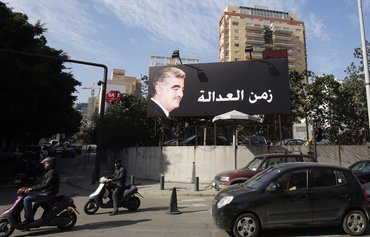A Bulgarian court on Monday (September 21st) sentenced two men to life in prison over a July 2012 bus bomb attack that killed five tourists, including a pregnant woman, at the country's Burgas airport.
The Bulgarian bus driver and the Franco-Lebanese who carried the explosive also were killed in the blast, which targeted Israeli tourists, and more than 35 people were injured.
Bulgarian and Israeli authorities blamed the bombing on Lebanese Hizbullah, playing a part in a subsequent EU decision to blacklist Hizbullah's military wing as a terrorist organisation.
Judge Adelina Ivanova sentenced the two men -- who fled Bulgaria and were tried in absentia -- to "life in jail without parole", finding them guilty of terrorism and manslaughter.
![Two buses explode on April 26th, 2013 as investigators re-enact the July 2012 Burgas airport bus bombing that killed five tourists near the town of Ihtiman in an effort to resolve some of the many still unanswered questions. [Nickolay Doychinov/AFP]](/cnmi_am/images/2020/09/21/26164-Bulgaria-explosion-recreation-600_384.jpg)
Two buses explode on April 26th, 2013 as investigators re-enact the July 2012 Burgas airport bus bombing that killed five tourists near the town of Ihtiman in an effort to resolve some of the many still unanswered questions. [Nickolay Doychinov/AFP]
The two were identified as Lebanese-Australian Meliad Farah, 31 at the time of the attack, and Lebanese-Canadian Hassan El Hajj Hassan, 24, and were charged in mid-2016 as the bomber's accomplices.
A DNA analysis identified the bomber as 23-year-old Franco-Lebanese national Mohamad Hassan al-Husseini.
Airport CCTV footage showed him wandering inside the airport's arrivals hall with a backpack shortly before the explosion that tore through a bus outside the terminal that was headed to Sunny Beach, a popular Black Sea destination.
According to witness accounts, he tried to put his backpack inside the luggage compartment of the bus when it exploded.
The tourists who were killed were all in their 20s, except for a pregnant 42-year-old woman.
Prosecutors were unable to determine if the explosive was triggered by the bomber or remotely detonated by one of two men, who also had helped him to assemble the explosive device.
Hizbullah 'links'
Prosecutor Evgenia Shtarkelova told reporters last week she "pleaded for the heaviest punishment because I consider that this terrorist act deserves to be punished in the heaviest possible way".
The two men were put on trial in absentia in January 2018 for a terrorist attack and manslaughter but were never tracked down.
According to an investigation into the bombing, they arrived in Bulgaria from Romania in June 2012, and left again on the evening after the attack.
Shtarkelova said that the nature of the explosive device, the fake US driver's licenses used by the two men, their Lebanese descent and some family ties "link both defendants (...) and the attack to the terrorist organisation Hizbullah".
The investigation into the attack found that the fake licenses were made by the same printer at a university in Lebanon. It also said the suspects received money from people linked to Hizbullah.
In recent comments on the case, Bulgaria's chief prosecutor Ivan Geshev stressed that Hizbullah was behind the attack "in terms of logistics and financing".
The two men are still sought on an Interpol red notice.
The court ruling is still subject to appeal to a higher court.

![Judges of Bulgaria's specialised criminal court arrive for the final decision for the 2012 bomb attack on tourists at Bulgaria's Burgas airport that killed five people, on September 21st, 2020 in Sofia. [Nikolay Doychinov/AFP]](/cnmi_am/images/2020/09/21/26163-Bulgaria-court-judges-600_384.jpg)





